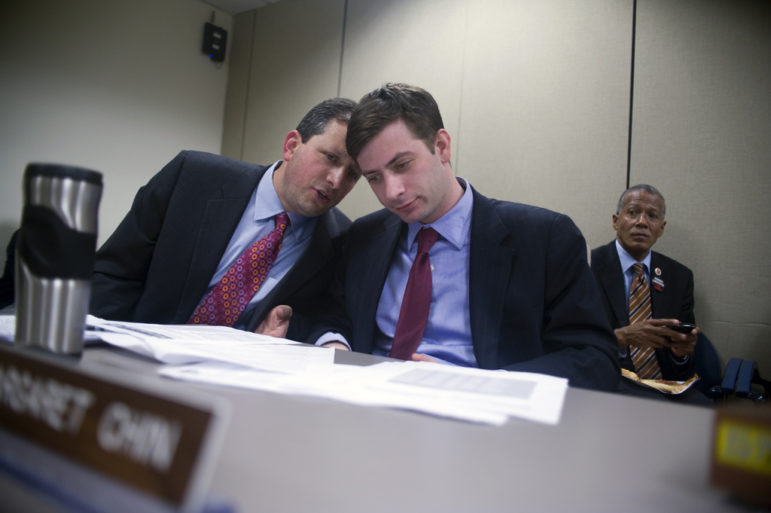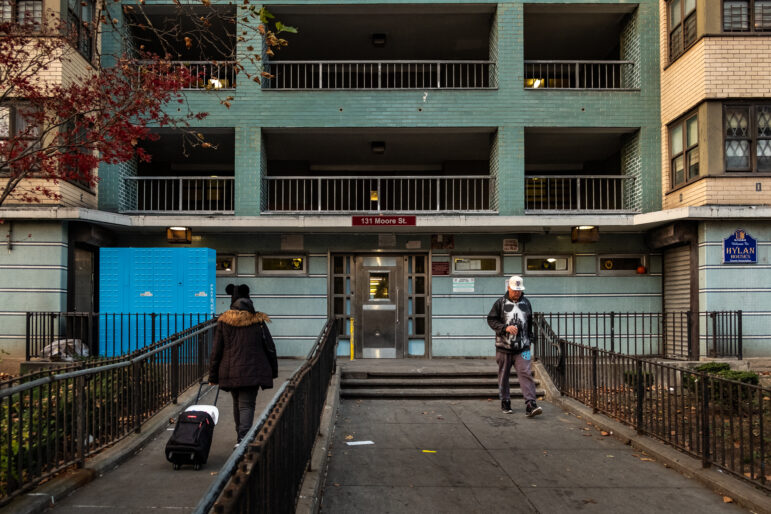
William Alatriste for the City Council
Councilmembers Lander and Levin are among the lawmakers pushing for new laws they say will help prevent tenants from being victims when a rezoning boosts property values.
On Tuesday, Gowanus tenants, advocates, and elected officials gathered outside 140 Fourth Avenue to denounce alleged harassment by the building’s landlord and to demand the city pass anti-displacement legislation to protect existing tenants.
Advocates with the Fifth Avenue Committee (FAC) said the 2003 rezoning of Fourth Avenue encouraged widespread harassment of rent-stabilized tenants on the street by property owners seeking to redevelop their properties and attract market-rate tenants—often using construction activities as a form of harassment.
In one case study documented by FAC, the owner of five rent-stabilized buildings including over 40 rent-stabilized units managed to remove all the tenants using buyouts or harassment before selling the building to a luxury apartment developer. “Vermin, flooding, mold, no heat, no hot water, suspicious fires, robberies, trash, and urine in the halls were the norm,” according to the case study.
At the press conference, the long-time tenants of 140 Fourth Avenue said that in 2014 their landlord, Zev Baum 1 LLC, began adding two floors to their building. Tenants said they have been subject since then to intolerable conditions, and six of the eight original families have left.
“The left side of my mom’s room collapsed entirely. If she were in the room she could have been injured—or God knows, she could have died, the accident was that horrific,” said Justin Lopez, a resident.
While the building was placed in an enforcement program by the Department of Housing, Preservation and Development (HPD) in 2014, FAC and tenants say conditions didn’t approve. HPD contends that the landlord did all the work required except in two occupied apartments (where violations will now be corrected thanks to a lawsuit brought against the landlord by the tenants and Brooklyn Legal Services). HPD has also agreed to perform an inspection of the apartments at the lawyers’ request, according to the agency.
“The city is very concerned about harassment, and we want to make sure we’re targeting efforts to deter and punish harassment as effectively as possible,” said Elizabeth Rohlfing, a spokesperson for the agency, in an e-mail to City Limits.
Advocates at the press conference were concerned with more than the fate of 140 4th Avenue, however; They are also worried about how the area’s tenants could be affected by a future rezoning. Council member Brad Lander has invited the Department of City Planning to consider rezoning the Gowanus, which some fear could lead to further displacement. In his view, a rezoning could be beneficial, but it is also vital that the city create new tools to fight harassment.
At the press conference, Lander said that in 2003, stakeholders had unsuccessfully demanded that the rezoning include anti-displacement measures and affordable housing. He commended the de Blasio administration for addressing the second of those demands by instituting a mandatory inclusionary housing policy, which will ensure that any new development generated by a potential future rezoning includes a portion of rent-restricted units, unlike the 2003 rezoning.
“But the first part of the problem, stronger protections in place for tenants who are in the way of new development, that has not yet been addressed,” Lander said. “We have as a city increased the funding for lawyers to help provide representation in housing court, but we haven’t done anything really to address the underlying incentives to harass.”
Lander and advocates are calling on the city to institute a citywide certificate of no harassment program modeled on special provisions in Hell’s Kitchen and other areas, which require HPD to determine that a landlord has no history of harassing tenants before the Department of Buildings can issue a permit to the landlord.
Community advocates in proposed rezoning areas throughout the city have called for the application of such a program to their neighborhoods, and since June a task force including Lander and HPD Commissioner Vicki Been has been deliberating the feasibility of adopting the program citywide. As investigating every landlord in the city who asks for a permit would be a challenge, the task force is trying to determine ways to screen for at-risk areas or at-risk buildings that should receive this extra level of scrutiny, Lander says. The task force expects to release its recommendations in late January.
Lander and advocates are also calling for the passage of a package of 12 bills known as Stand for Tenant Safety, which also aim to prevent landlords from using unsafe building conditions to displace tenants. The bills, introduced in September 2015, would create a Real Time Enforcement unit to ensure responses to tenant complaints within two hours, increase penalties for work without a permit, ensure the city could collect on fines by allowing the city to place a lien and potentially foreclose on properties whose owners fail to pay up, and other measures.
The Committee on Housing and Buildings has so far held hearings for seven of the twelve bills. Representatives from DOB, while remaining open to working with the Council, have found fault with some attributes of the bills. For instance, they’ve said that responding to complaints within two hours would be impossible “absent a tremendous investment of new resources.” They have disputed the effectiveness of increasing penalties for violators, but have expressed interest in working with the state to allow liens to be placed on uncollected violations.
DOB also emphasized that they are dedicated to stemming tenant harassment and have made several reforms already, including obtaining data from the state to ensure they can catch when an owner lies about when a rent-stabilized building is unoccupied, and increasing the accessibility of Tenant Protection Plans (documents that property owners submit when they file construction documents).
Advocates for the bills say that if the city increases penalties and finds a way to collect them, it could pay for an expansion of new enforcement activities.
Absent the citywide adoption of these bills, the Fifth Avenue says these anti-displacement strategies should be applied to a special Gowanus district. Lander says he thinks it makes more sense for these policies to be adopted on a citywide level. Asked if he’d reject a rezoning without these measures in place, Lander said it was important to craft a plan that effectively addresses displacement and other issues, but that it does not make sense to adopt a ‘make or break’’position on each legislative proposal from the outset.









3 thoughts on “Advocates in Potential Rezoning Sites Want New Laws to Protect Tenants”
When you ask HPD how they track their developers and property managers nobody knows. What metrics are used? This has been an ongoing problem that Vicky Been and her staff continue to ignore, especially when her ties to the Moelis Institute for Affordable Housing Policy Institute. Now, follow how many L&M properties are now managed by L&M and BFC.
Its good that Lander and Levine finally woke up about this problem, but where were these two jerks years ago when tenant harassment needed to be prevented? Lander and Levine, the new Laurel and Hardy of the City Council, have been more concerned with voting themselves a 100% salary increase (voted in Jan. 2016), legislating what should be known as the Lander & Levine Nickel Bag Tax (did the supermarket chain interests make donations to their re-election fund?), telling the police not to issue citations for urinating in public but then changed their minds that tickets need to be given to only white men who dress as Santas, bashing Israel and repeating blood-libels at a city council hearing, fighting for the rights of illegals and providing social services for those who don’t belong in our country, fighting against Islamophobia, even though it has been determined that most of the police reports have proven that Muslims lied about these incidents, getting arrested for closing down downtown streets which are out of their districts as they dare not disrupt their own neighborhoods, and holding rallies of which are attended by 20 people all over the city fighting against the mean old Trump, who they know claim shouldn’t be our new President even though he won. When will Lander & Levine be term-limited? If these two are so much in love with President Obama, let them set an example and drop their luxury medical insurance plan which the city gives them and go on an Obama Care Plan.
Zoning in NYC is a complicated matter but note that more and more communities in all 5 boroughs are opposed to deBlasio’s heavy-handed upzoning proposals. Particularly those spot upzonings like the suspicious one stopped by the residents of Inwood.
http://pix11.com/2016/08/16/gentrification-and-affordable-housing-debated-on-a-block-in-inwood/